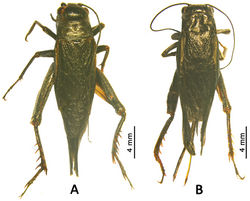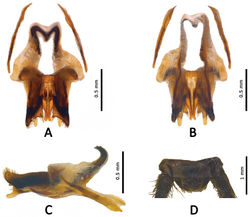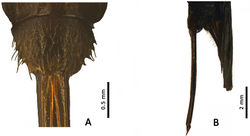Qingryllus jiguanshanensis
| Notice: | This page is derived from the original publication listed below, whose author(s) should always be credited. Further contributors may edit and improve the content of this page and, consequently, need to be credited as well (see page history). Any assessment of factual correctness requires a careful review of the original article as well as of subsequent contributions.
If you are uncertain whether your planned contribution is correct or not, we suggest that you use the associated discussion page instead of editing the page directly. This page should be cited as follows (rationale):
Citation formats to copy and paste
BibTeX: @article{Liu2017ZooKeys, RIS/ Endnote: TY - JOUR Wikipedia/ Citizendium: <ref name="Liu2017ZooKeys">{{Citation See also the citation download page at the journal. |
Ordo: Orthoptera
Familia: Gryllidae
Genus: Qingryllus
Name
Qingryllus jiguanshanensis Liu & Zhang & Shi, 2017 sp. n. – Wikispecies link – ZooBank link – Pensoft Profile
Type material
Holotype ♂: CHINA: Sichuan, Chongzhou, Jiguanshan, Shaoyaogou, 29.V.2016, leg. Fuming Shi. Paratypes: 1♂, 1♀: same data as the holotype.
Description
Male: Body medium, slightly small (Figure 2A). Head globular, smooth, with few pubescence. Frontal rostrum slightly obvious, dorsal surface flat, 1.8 times as wide as the scapus; eyes slightly protruding, rounded, located in latero-anterior sides of head; ocelli slightly rounded, median ocellus very small, lateral ocelli distinctly large; third joint of maxillary palpus distinctly long, 1.7 times as long as 4th joint, slightly shorter than 5th joint, 5th joint widened apically, apical margin transversal and arc-shaped; last joint of labial palpus slightly longer than 2th joint, slightly widened at apex, apical margin obtuse. Pronotum transverse, anterior margin slightly concave, nearly as wide as the head, distinctly widened posteriorly, posterior margin nearly straight, 1.3 times as wide as the anterior margin, 2.1 times wider than the length of pronotum; centre of pronotal disc with inconspicuous longitudinal furrow, the lateral sides with crescent impressions, lateral margins angularly rounded bent into paranota; lateral lobes distinctly smooth, without tomenta, anterior lower angles right angled, terminal obtuse, distinctly rising backwards, posterior lower angles wide, rounded. Tegmina slightly overlapping abdominal apex, with several irregular longitudinal veins and numerous transverse veins, forming irregular reticulum. Hind wings distinctly overlapping tegmina. Fore legs smooth, with no tympanum and no impressions on tibiae. Hind tibiae with four pairs of dorsal spines and three pairs of apical spurs on both sides, of which inner, upper and medial apical spurs are equal in length and distinctly longer than lower apical spurs; outer, upper and lower apical spurs slightly shorter than middle ones, nearly equal in length. Dorsal area of first tarsi with 5–8 outer and 4–5 inner spinules. Supra anal plate (Figure 3D) semicircular, posterior margin broad, round. Subgenital plate rather long, narrowed posteriorly, coniform. Genitalia (Figure 3A–C). Epiphallus slightly longitudinal, anterior margin distinctly concave in middle; middle part of epiphallus narrowest, and distinctly widened anteriorly and posteriorly; apical part of epiphallus with two divided lobes, posterior margin slightly concave bearing setae. Ectoparamers semimembranous and long finger-like, not overlapping posterior margin of epiphallus; medial lobes short and slightly divided at apex. Endoparamers narrowed, reaching middle part of epiphallus. Apodeme distinctly developed and bend upward at apex. Female (Figure 2B): Body very similar to that of male. Subgenital plate (Figure 4A) wide and short, narrowed posteriorly, posterior margin nearly straight. Ovipositor (Figure 4B) long and straight, near the end not swollen, apex acute. Colouration. Body black brown to black. Part of 4thand 5th joint of maxillary palpus, superior border of eyes, vein of tegmina on lateral sides and lower sides of hind femur yellowish-white.
Measurements
(mm). Male: body 11.2–12.2, length with wings 17.0–17.5, pronotum 1.9–2.0, tegmen 9.5–9.6, hind femur 7.0–7.5; Female: body 11.0, length with wings 16.0, pronotum 2.0, tegmen 9.5, hind femur 7.0, ovipositor 9.5.
Diagnosis
This new species is similar to the type species, but differs from the latter by the posterior margin of pronotum being distinctly widened; veins of tegmina yellowish-white only on lateral side of dorsal area (between dorsal and lateral area of tegmina); epiphallus distinctly widened posteriorly. In the type species, the posterior margin of pronotum being slightly widened; basal part of dorsal area of tegmina also yellowish-white; epiphallus distinctly narrowed at apex.
Distribution
China (Sichuan).
Etymology
The specific name is derived from its type locality, Jiguanshan (China: Sichuan).
Original Description
- Liu, H; Zhang, D; Shi, F; 2017: Qingryllus jiguanshanensis sp. n. from Sichuan, China, the second species of Qingryllus (Orthoptera, Gryllidae) ZooKeys, (663): 65-70. doi
Images
|


